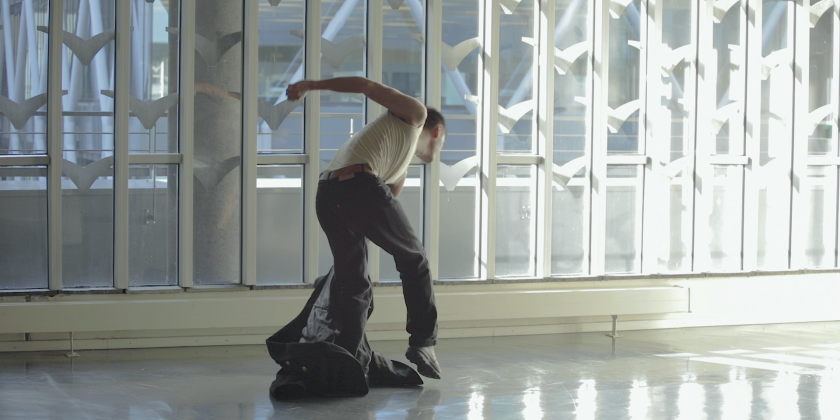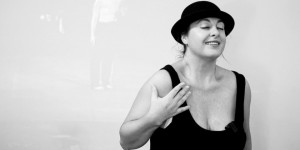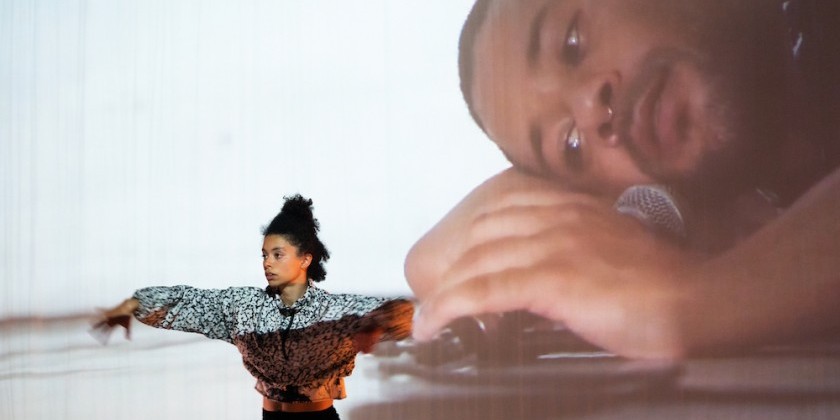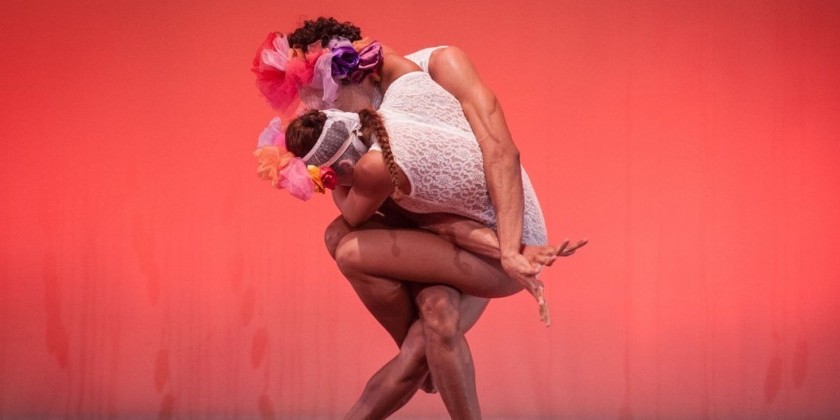IMPRESSIONS: Café La MaMa Live: La MaMa Moves! Online, Featuring Kari Hoaas and Anabella Lenzu

January 20, 2021
Curated and hosted by Nicky Paraiso
Heat- the distant episodes
Choreography by: Kari Hoaas
Dancers: Alexander Aaro, Ida Haugen, Jens Jeffry Trinidad
The night that you stopped acting/ La noche que dejaste de actuar
Solo Performance/Direction by Anabella Lenzu
Like smoke unfurling from a candle flame, soloist Ida Haugen stands on the landing of a steel staircase, coiling and uncoiling her spine. With a bright blue sky as her backdrop, Haugen cautiously explores the space around her, finding upright just before melting again.
In Heat- the distant episodes, choreographer Kari Hoass presents a series of dance haikus based on her stage work Be Like Water, which was scheduled for a US tour when the pandemic hit. Perfect for the second edition of Café La MaMa, a series that provides artists a place to reimagine their work for online platforms, each solo was created on location in a former airport in Oslo, Norway.
.png)
In Haiku #6- Grow, Haugen’s undulations are controlled but not rigid, tremendously detailed, yet calm. As she stretches and wafts slowly down the stairs, perhaps searching for opportunities to transform from vapor to liquid, she never quite coalesces.
Haiku #7-Wish finds dancer Jens Jeffry Trinidad, an alien creature, birthing himself. Filmed in a hallway of the airport, with steel triangular window frames behind him, Trinidad appears trapped, caged. Bound and angular, he contorts almost imperceptibly, his miniscule shifts of weight, specific and seamless. The long dark trench coat he wears hangs from his body like discarded skin. Like Haugen before him, Trinidad’s navigations mesmerize. Juxtaposed with their kinetic flow is a meditative quiet.
.png)
Haugen reappears, this time monstrous and contained, in Haiku #9- Rise, which takes place in the airport’s cafeteria. Seated at a table, she rises with difficulty only to be pushed down by an invisible force. If Trinidad was an alien creature being born, Haugen could be the mother from which he emerged. Mouth open in a silent scream, her arms and torso tick in tense spasms.
We are outside the airport in an empty parking lot for Haiku #8- Lot. In front of a large puddle, Alexander Aaro, like a blind man finding his way through an unfamiliar space, careens. His image reflects in the water creating the effect of two people dancing, one on top of the other. The dancer and his duplicate fall and catch each other in awkward yet fascinating off-center balances and turns, another engrossing example of Hoass’ choreographic dexterity.

The night that you stopped acting/La noche que dejaste de actuar, a dance-theater piece created and performed by Anabella Lenzu, was also scheduled for a live performance, then adapted for film courtesy of the global pandemic. Here, Lenzu looks back at her youth, reflecting on the various personas she has inhabited as an immigrant Latina artist in New York City.
The film opens with Lenzu instructing Alexa to play music. “She doesn’t like my Argentinian accent,” the soloist explains dryly. After attempting a variety of different accents to tempt Alexa into action, Lenzu turns on the music herself. She dances wildly as if at a party, stopping periodically to point at us, accusingly.
An engaging storyteller, Lenzu manipulates movement, spoken word, music, video projections and props, to take us on a tour of her life as a performer. She speaks to us directly as if we are old friends, sharing personal perspectives that touch on the universal. Wanting to dance ballet in a pink tutu and tiara when she was five years old, she was instead forced to perform in a tight purple suit as a male bull fighter. Later, showing a video of herself dancing as Pagliacci the clown, she mimics the projected character’s movements. Turning directly to us she says, “I’m not a man or a clown.”

Lenzu illuminates her disappointment at having to be someone she’s not, and we can feel the crushing judgement of others as she questions her roles. When she attempts a convulsive breathing section alongside her twenty-one-year-old-self on video, she pauses, winded, telling us she can’t do anymore because her abdominals are weak from having two children.
Suddenly a phone rings, Lenzu picks up and starts arguing in rapid Spanish with the person on the other end. In English, she screams, “Do you think I have talent? Do you know how long I worked on this performance?”
The candid humor evident on her face, in her raised eyebrows, and her self-satisfied smirks dares us to challenge her identity. Raising a wine glass full of water to the camera, she laughs, " I am an artist and this is me.”













